Can You Identify These 5 Classics?
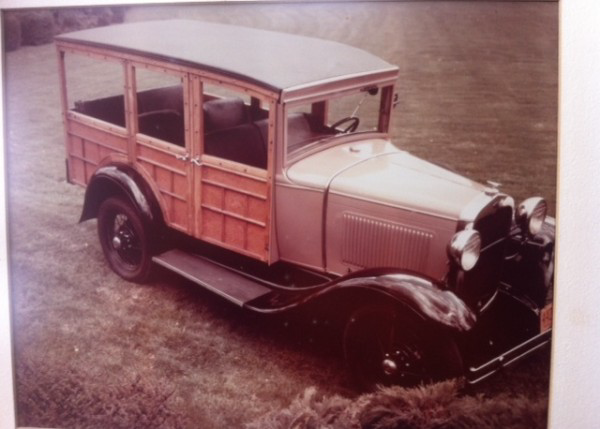
From Eric J. – I bought this collection of vintage color photos. I don’t know much about vintage autos so I would appreciate it if you could help me identify the make/model/years of the 5 vehicles. Somebody told me that the last image is of an Austin Chummy, but I couldn’t find anything similar on the web. As you can see, all the pictures were taken in the same spot. They were also professionally framed with glare free glass sometime during the late 30’s in Detroit (judging by the framer’s label on the back). Any help you could provide would be greatly appreciated. Thanks in advance for your help!
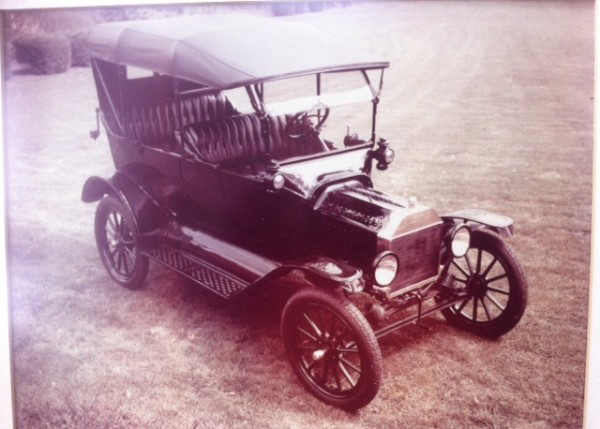
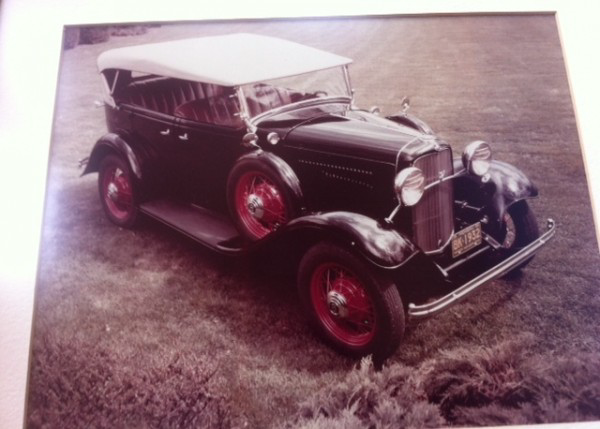
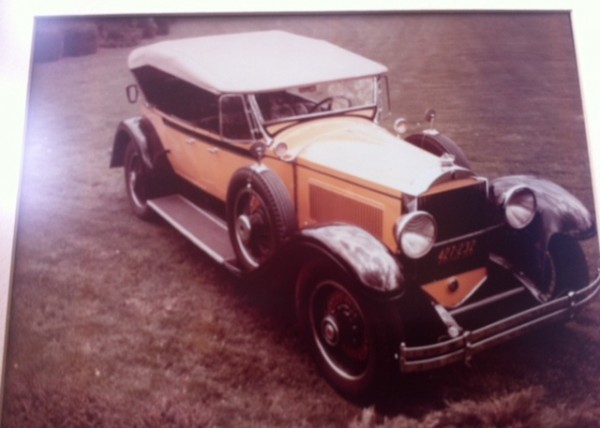
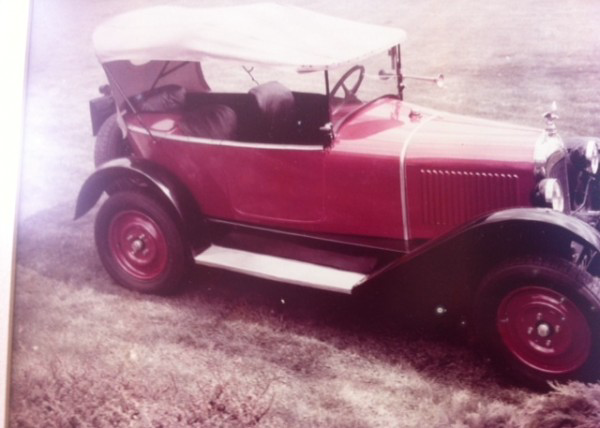
Auctions Ending Soon
 2002 Subaru Impreza WRXBid Now2 days$333
2002 Subaru Impreza WRXBid Now2 days$333
 1975 Chevrolet Corvette ConvertibleBid Now2 days$4,000
1975 Chevrolet Corvette ConvertibleBid Now2 days$4,000
 1964 Ford F-100 Camper CustomBid Now2 days$2,000
1964 Ford F-100 Camper CustomBid Now2 days$2,000
 2006 Jeep Wrangler SportBid Now4 days$10,500
2006 Jeep Wrangler SportBid Now4 days$10,500
 1974 Datsun 260ZBid Now6 days$460
1974 Datsun 260ZBid Now6 days$460

Comments
I don’t recognize all of them. The first must be a 1930 Model A Ford Woody wagon, the second is a Model T Touring, somewhere between 1915-1920, third a 1932 Ford V8 Pheaton, then a Packard, I guess from 1927. The last one I don’t know, it might be something French.
The last one looks like a 1934? DATSUN
Last car looks like a Citroen 5 CV C2 circa 1924.
See fifth photo down: http://lord-k.livejournal.com/1043075.html?thread=12881027
yes – I think you are right. Same wheels etc.
I think the first is an early Alvis (A british manufactorer), The Second is a Model T “Stereo Type” Ford, I’m not sure about the third but I think its a pre 30s Continnental design, I’m not sure from who, The 4th looks like a Custom Bently annd the fith a custom MG.
What you have to keep in mind is that in the era these cars were created the fasion was for “coach buildinng” where-buy you bould purchace a rolling chassis from a manufactorer like Ford, Bently, Aston Martin, Austin, Morris Ect. and send it to a coach builders with your specifications resulting in a purely unique car, all the engines were basic annd agricultrual resulting in that good looking nnose and as a result of these things you may not be able to tell.
Donn’t belive me MG or “Morris Garages” Started in a simmilar way, itwas just onne bloke who wanted a unnique sports car so he bought a chassis from Austin/Morris and put his ownn body work on it, then his friends and family wanted one and from there it turned into the company we knnow today with motor racing pedigree.
Yes in the UK you do or did have small cottage shops making wonderful and unique autos but these are US based standard productions cars, in my opinion.
The woody is a Ford Model A, The black phaeton after, is a Model T. Then there’s the black phaeton with red wire wheels: that’s a 1932 Ford, The yellow bodied, black-fendered beauty is a mid/late 1920s Packard. I do not know what the red car is
Not sure, but I have a hunch that last one is a French Panhard.
I tried to include I picture in my first post, but it did not work. Perhaps a link will work.
http://www.panhardclub.co.uk/
1930 Ford Model A wagon
Ford Model T, brass radiator makes it 1915 or older. That’s a close as I can come.
1932 Ford V-8 phaeton
1932 Packard
1925 Citroen
Ooops, just realized the T has electric headlights, which would make it a between a 1913 and 1915. I’m too lazy this Friday morning to search for the exact year electric lights were added;)
Agree with Z1 rider
Where are you from? I live in Michigan My family is originally from southwest virginia. I’m very interested in cars but your name caught my eye. later Mike
Last car is definitely NOT an Austin Chummy. Far too big and not anything like a Chummy. My guess is the Citroen C5 “Cloveleaf” probably around 1924, which can be also defined by the disc wheels and the single center “Mother-in-law” seat in the rear.
After some extensive trawling (mostly through photos of “The King”) I have found proof that the first is an Alvis.
Sorry but that is most assuredly a Model A Ford, and a 1930 to be exact.
You’re trawling in the wrong waters–it’s definitely a Model A Ford.
Model A with US lic plates.
Can you show us that proof? Because every part I see belongs to a Model A Ford; radiator, wheels and hubcaps, fenders, lights, cowl, etc.
The post says the photos are from the 30’s? Color photos were around but looks more like the 70’s as the color fades. I can’t imagine anyone wanting to photograph a model T or A that was only 10 years old and Very common. These cars are all beautifully restored and it seemed the owner loved them very much, but in the 30’s Black and white was the norm.
I noticed that also,in 1930 a 1929 ford huckster was not a classic
I belive color photos of the time were colorized,photographed in black and white and at a later time color was added
The odds of those very different cars, all in pristine condition, all being photographed in the same place, in the 1930’s (Notice the bushes in the background) is not possible. It is a more modern day fake. I can’t believe how many are buying into it.
When I was a teen, I owned a early 32 Ford model B conv. with a 4 cyl. This 32 is a V8 as shown by the emblem on cross bar between headlights. The last is definitely a Citroen C5 boat tail.
The first one sure looks like a 1926 Flint or Durant. My Dad had one. Have not a clue though.
Really interesting that the frames say they are from the 30’s, yet color photography was rare. Since they were done in Detroit, my guess is someone with very deep pockets was photographing their collection.
I think the last car is a British made Ford.
This debate is getting ridiculous. All five cars have been definitively identiied.
Agreed – but the question now is which identity is correct. LOL
OK Charles – you win! – What are they?
Tough call on anything British – no right-hand steering; high definition color leaves me puzzled – doesn’t fit the alleged timeline for the origin.
Interesting that all backgrounds are identical (staged?)
There is no question in my mind that the first photo is a Ford Model “A” Depot Hack, probably a 1930 or possibly 1931, and that the second photo is a Ford Model “T” Touring Car, brass radiator suggests prior to 1916, but electric lights indicate later than 1912, so probably a 1913-1915. Third photo is clearly a Ford V8, probably around a 1932. Fourth is a Packard from around 1927 or 1928, probably a Model 120, and the fifith photo is a Citroen C5 Cloverleaf roadster from around 1923, as confirmed from the disk wheels and the single rear “Mother-In-Law” seat, like this one http://www.angliacarauctions.co.uk/en/classic-auctions/results/results-november-2013/1925-citroen-cloverleaf.aspx
Chas
Spot on Charles. There sure are a lot of “expert opinions” on here, but you’re the first to get them all right.
I have to disagree with Charles Gould on the year and model of the Packard. The year is very likely a 1930, and it’s definitely not a 120, the 120 was introduced in late 1934 or 1935. The Packard model lineup is complex confusing in this era, but it’s likely either a Deluxe Eight or Custom Eight Phaeton. Possibly a Standard Eight. I agree with Charles on all the others.
The Packard is newer than a series 3, which means it is later than 1927. It is likely a series 6, maybe 7 which puts in the 1929-1931 realm. It is a Phaeton, which I don’t believe Packard manufactured any phaetons until 1929. It’s not a 32; the ’32 Packard had radiator shutters. It’s not a model 120; the Packard Model 120 did not come out until late 1930’s. The tire mounted rear-view mirrors look very much like the after market variety available for years from “The Compete Automobilist” in UK.
Last car is definitely a Citroen from ’20’s, as the rear, partially hidden by the top, is a boat tail with tiny hatch cover – and is very similar to a ’23 Citroen “Trefle” roadster, which I think means 3 seater, owned until recently, by our de facto Detroit area Citroen club leader, Gene Silverman. Tiny 4 cyl engine, huge steel disc wheels, with brass lug nuts which were always working loose, making Gene think his steering was worn out! A quick tightening with a wrench solved the problem until they wobbled loose again……but why brass?? Even the early Traction Avants, like my old ’38 TA roadster, had brass lug nuts – strange….. Lugnuts aside, that car is cute as a bug, and quite valuable today. Was probably Citroen’s first economy car, preceding of course the ultimate economy car, the Duck.
The T is a 1916. That was the last year for the brass radiator and the first year for electric headlights. The headlights were powered from the magneto.
I think we have a consensus on all but the year of the Packard. I do not know Packards specifically so I had to make my guess on the year based on the styling trends in the industry around the late 20’s through early 30’s. My rationale was as follows:
The Packard has wire wheels, pretty universal by the 30-31 model years of most if not all car manufacturers replacing disc wheels that had their heyday from around 1925 to 1930, excepting of course Ford which first offered wire wheels as an option on Model T’s for 26 and 27 and never offered disc wheels. The radiator of the Packard is flat and vertical. By 33/34 most companies were using grilles forward of the radiator with most tapering the grille to a point at the bottom. The triangular body color panel at the bottom of the radiator of the Packard in this picture seems to presage the tapered/pointed style of grilles to follow. Someone has noted that Packards from 1932 on had grille shutters, so I will accept that and change my guess for the year to be 30 or 31.
As a side note, after making my original guess for the year, I went to google images to try to settle the question. That really didn’t help as there was a great variety of grilles shown for single model years though it did allow me to rule out the late 20’s as those Packards used more cylindrical shaped headlights rather than the tapered ones shown here. Unfortunately when using Google images you are at the mercy of the person who tags the photos and they are often wrong.
My description of the Packard comes from today owning and driving my 1927 Packard Touring model 343-290, which I keep up on a lift. It is an original survivor, only receiving needed repairs to keep it from deteriorating. It gets to see the light of day occasionally as I preserve it for the next steward of this fine car. Z1rider is correct about the shape of the headlights. My ’27 has the “barrel” headlamps. Since there were very few model 4 or model 5 Packards, the next series is the 6 about 1930. The radiator shutters started in 1932. The third photo from Packard International’s rolling photos is my car.
I stand corrected on the year and the model of the Packard. Thanks for pointing out the differences to me.
Chas
Interesting on the Citroen that the picture provided above shows the bar connected between the headlights to have angles in it, while all the other pictures provided show a straight bar. Only inconsistency in what seems to be a spot-on ID. Fun game!
I’m gonna declare that these photographs are NOT from the thirties, but agree with Jeffry H the spectrum of color fading (and the matte glass, for that matter) are indicative of late seventies/early eighties work. Additionally, most license plates of the 1930’s did not have the standardized format of modern plates. They were much thinner. I’m saying the plate on the Ford Phaeton is The Tell. I’m too lazy to go on the license plate collecting sites and find out which years that Michigan (if that’s the state, too fuzzy for me to tell) used those colors myself, but anyone with a constructive dollop of OCD and their morning coffee should be able to locate the state/year, especially if OP provided a sharper image that was not taken at an off-axis angle (outside on an overcast day–(s)he was probably fighting artificial lighting glare inside… my .02 worth.
Hi guys, hope all is clarified that these cars are all American except the last French Citroen.
Regarding color photography, I was amazed with a bit of general knowledge I was given a month ago.
It existed as far back as 1910. Check this link
http://www.pinterest.com/sannieburen/albert-kahn-collection/
I do collect old photographs related to automobiles in India, I do know about colorized photos, I also am aware that the early color photographs were not exactly true, maybe aging took place, but Albert Kahn did something amazing.
A bit off-topic, I am sure many have not heard of this before.
Cheers Harit
You are all correct about the Model ‘A’ woody, which I think was called a ‘hack’. If it’s a 1930 then it’s wearing 1928 wheels and hub caps. I would say it’s all 1928 due to the small hub cap.
If the bottom of gas tank cowl is curved towards the front of the model A, as it appears, it is a ’28 or ’29. Only two years for that tank.
In that case, there must be a wrong radiator mounted. The one with a black part around the starter-hole was only used in ’30.
30 Model A standard wagon
15 or early 16 Model T ck the headlights
32 Ford V-8
30 Packard
???